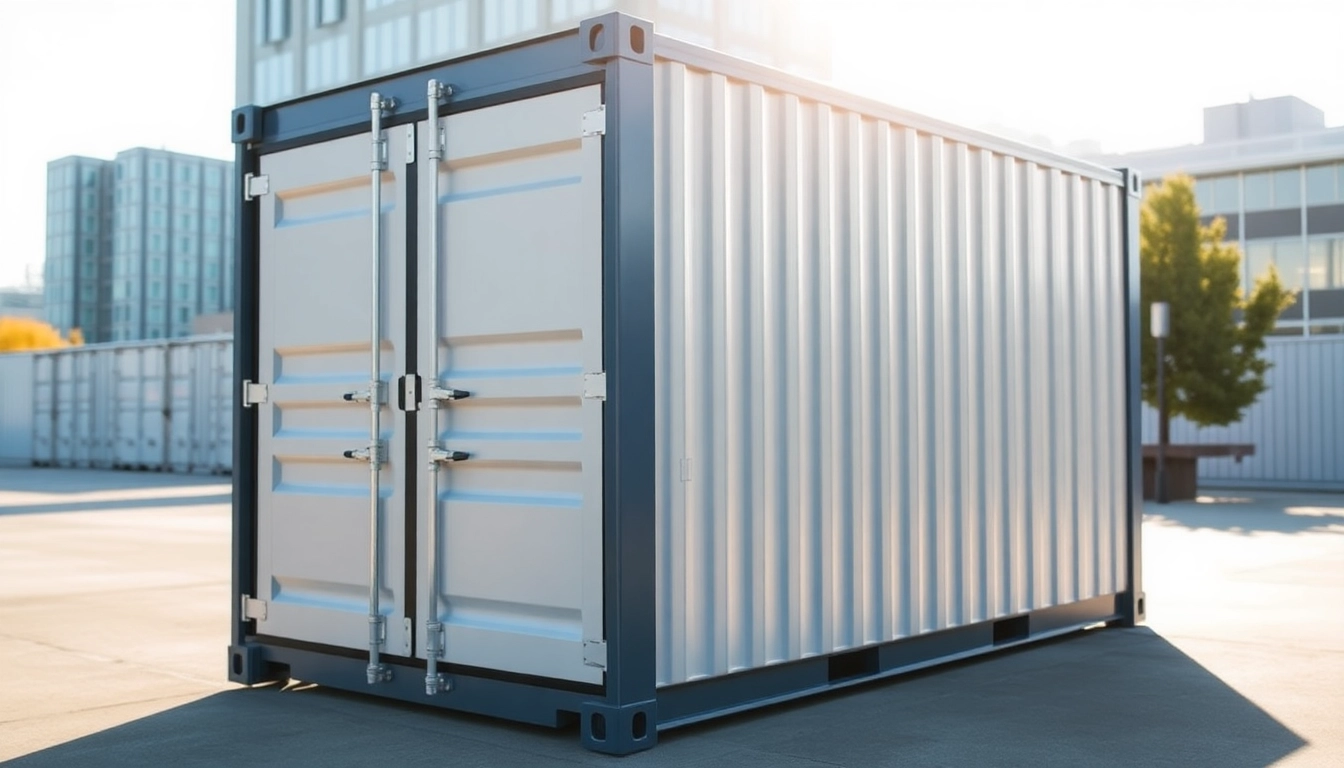Understanding the Basics of Container Rental
Container rental has become an increasingly vital solution across various industries, offering flexible, secure, and cost-effective storage and transportation options. Whether you need temporary storage for construction sites, secure shipping containers for international logistics, or mobile units for events and retail, understanding the core aspects of container rental is essential for making informed decisions. The UK market, in particular, has seen substantial growth due to the demand for versatile storage solutions that can adapt to fluctuating project requirements.
At the heart of this market is the concept of Container rental. This service provides businesses and individuals with access to a broad spectrum of container types, each designed to meet specific operational needs. From small portable units to large-scale shipping containers, the rental industry in the UK offers a comprehensive array of options tailored to different sectors—including construction, logistics, retail, event management, and urban development.
Types of Containers Available for Rent
Choosing the right container begins with understanding the various types available on the market. The most common categories include:
- Standard Shipping Containers: Typically made of durable steel, these are used primarily for transporting goods across long distances. Sizes generally range from 10ft to 40ft, with 20ft and 40ft being the most popular for both rental and purchase.
- Storage Containers: Designed for on-site storage, these units often feature lockable doors and weather-resistant exteriors. They are used widely in construction projects, retail inventory storage, and emergency response scenarios.
- Refrigerated Containers (Reefers): Equipped with temperature control systems, these containers are essential in industries dealing with perishables such as food and pharmaceuticals.
- Site Containers and Modular Units: Customized for site accommodation, including offices, living spaces, or sanitary facilities, these containers can be adapted for various temporary use cases.
Among these, the most rented in the UK tend to be the standard 20ft and 40ft storage units, valued for their size, versatility, and ease of transport. Providers such as Portable Space and TitanContainers deliver a broad range of these units, often with flexible rental terms to suit project timelines and budget constraints.
Key Features and Benefits of Rental Containers
Understanding the features of rental containers highlights why they are indispensable in modern commercial and industrial operations:
- Cost-Effectiveness: Rental containers eliminate the need for capital investment, reducing upfront costs. They are especially beneficial for short-term projects or seasonal demands.
- Flexibility: Rental periods can be tailored from a few weeks to several years, allowing businesses to scale their storage or transportation capacity as needed.
- Durability and Security: Built with heavy-duty materials like steel, rental containers offer excellent protection against theft, vandalism, and environmental elements.
- Mobility: Containers can be delivered and repositioned with ease, providing logistical flexibility for fast-paced operations.
- Customizable Options: Many providers offer modifications such as ventilation, shelving, insulation, or security upgrades to meet specific requirements.
The combination of these features ensures that rental containers not only serve as storage units but also as adaptable solutions that enhance operational efficiency across sectors.
Common Use Cases Across Industries
Container rental solutions are highly versatile, serving a broad range of applications:
Construction and Infrastructure
Construction sites frequently use containers for secure on-site storage of tools, materials, and equipment. Portable offices and welfare units are also commonly deployed for workforce facilities, ensuring compliance with safety and welfare standards.
Logistics and Shipping
In logistics networks, containers are essential for international and domestic freight transport. Renting provides flexibility in managing fluctuating inventory needs, especially during peak seasons or large-scale distribution campaigns.
Event Management and Temporary Installations
Event organizers utilize containers for mobile kiosks, storage spaces, or even temporary accommodation, leveraging their mobility and quick deployment capabilities.
Retail and Commercial Uses
Retailers employ containers as pop-up shops, storage facilities, or even mobile offices, particularly in high-traffic locations or during seasonal sales periods.
Emergency and Humanitarian Relief
In disaster-stricken areas, rental containers serve as emergency shelters, medical stations, or supply depots, providing rapid deployment and scalable solutions.
These use cases demonstrate how container rental is integral to operational flexibility, cost efficiency, and project scalability across various sectors.
Factors to Consider When Choosing a Container Rental Provider
Rental Terms and Flexibility
Before entering into a rental agreement, evaluate the flexibility offered by the provider. Consider factors such as minimum rental periods, options to extend or shorten rental durations, and cancellation policies. Providers like Sunbelt Rentals and WillBox often offer custom contracts to fit project timelines, ensuring you don’t pay for unused periods or face rigid terms that hinder operational agility.
Additionally, check whether the provider allows for multiple relocations of the container during the rental period, which can be critical for dynamic project sites.
Pricing Structures and Hidden Costs
Rental costs vary depending on container size, duration, location, and additional features. Transparency is key; inquire about all potential charges, including delivery, collection, maintenance, insurance, and potential penalties for early termination. Some providers advertise competitive monthly rates that may overlook hidden fees, so obtaining a comprehensive quote upfront is vital to avoid unexpected expenses.
For example, Boxrent offers competitive monthly pricing (~£60 for a 20ft container) with clear cost breakdowns, enabling more accurate budgeting.
Delivery, Collection, and Location Services
Ensure the provider can deliver and collect containers at your desired locations, especially if the site is remote or challenging to access. Check if they include transport costs in their quotes or if these are billed separately. Companies like TitanContainers and WillBox have extensive logistics networks across the UK, providing prompt delivery and flexible collection schedules, which are crucial for maintaining project timelines.
Availability of on-site storage in the exact size and type needed is essential for optimal operation, so verify their inventory range and capacity.
Best Practices for Renting Containers Effectively
Assessing Your Storage or Transportation Needs
Start by accurately defining your requirements. Consider volume, access frequency, environmental conditions, and security needs. Conduct site assessments, and if possible, consult with rental specialists who can recommend suitable container types and sizes. Proper needs analysis ensures you select a container that maximizes utility while avoiding unnecessary costs.
For instance, a construction project may require a combination of secure tools storage and temporary office modules, while a retail event might need a mobile, visually appealing kiosk setup.
Ensuring Compliance and Safety Standards
Adherence to safety standards is critical, especially for containers used as workplaces or public-facing structures. Confirm that the provider’s containers meet UK safety regulations, including structural integrity, security features, and environmental protections. Regular maintenance and inspections should be part of the rental agreement to prevent accidents or damage liabilities.
Moreover, if the container is converted for specific uses (e.g., office or restroom), ensure it complies with local building codes and health and safety legislation.
Optimizing Rental Duration and Maintenance
Plan your rental period based on project milestones or seasonal forecasts. Prolonged rentals can often be negotiated at reduced rates, while short-term needs might incur premium charges. Maintain good communication with your provider to schedule regular inspections, repairs, and cleaning, which extend the lifespan and functionality of the container.
Implementing a proactive maintenance schedule minimizes downtime and unexpected repair costs, ensuring continuous operational efficiency.
Cost Optimization and Budgeting Tips
Comparing Rental Prices Across Providers
Market research is essential to secure the best deal. Compile quotes from multiple providers, paying attention to included services and potential hidden costs. Use benchmark data, such as the typical cost of £60 per month for a 20ft container, to evaluate offers critically.
Providers like Unit Group and WillBox offer extensive options across the UK, facilitating side-by-side comparisons that highlight value for money and service quality.
Negotiating Contract Terms for Savings
Leverage your research and long-term commitments to negotiate better rates or favorable terms. Bulk rentals, extended durations, or multiple container orders often unlock discounts. Additionally, confirm the inclusion of delivery, collection, and maintenance costs in the negotiated price.
Establishing a strong relationship with your provider can also lead to priority service, flexible payments, and seasonal discounts, all contributing to project cost efficiencies.
Understanding Additional Fees and Charges
Always scrutinize the contract for extra charges such as late return penalties, damage fees, or administrative costs. Clear understanding prevents budget overruns. Some providers, like ContainerContainer.com, emphasize transparent pricing starting from as low as £10 for rental, with detailed ancillary fee disclosures.
Budget planning should incorporate these potential expenses to ensure complete financial control over your container rental project.
Case Studies and Customer Success Stories
Examples of Effective Container Rental Projects
One notable example involves a construction company in Manchester that rented 15 secure storage containers for tools and materials during a 12-month project. By partnering with a local rental provider offering flexible terms, the firm minimized overhead costs and avoided delays caused by equipment theft.
Similarly, a retail brand used rented containers as pop-up shops during seasonal sales in central London. The containers were customized with branding, quickly deployed, and removed post-event, demonstrating how rental solutions support marketing and sales initiatives.
Client Testimonials Highlighting Service Quality
Clients frequently praise providers like TitanContainers for their reliable delivery schedules and well-maintained units. Feedback often emphasizes the importance of clear communication, transparent costs, and tailored container options.
For example, one logistics manager noted: “Renting with Titan gave us peace of mind knowing the containers were secure, and the flexible rental terms adapted perfectly to our seasonal needs.”
Innovative Uses of Rental Containers in Different Sectors
Innovators use rental containers creatively—transforming standard units into mobile clinics, pop-up hospitality venues, or even modular emergency housing solutions. This trend is accelerating as container conversions become more affordable and customizable, expanding the potential applications of container rental across sectors.
Such innovations not only demonstrate adaptability but also showcase the economic and environmental benefits of reusing and repurposing existing container infrastructure.









